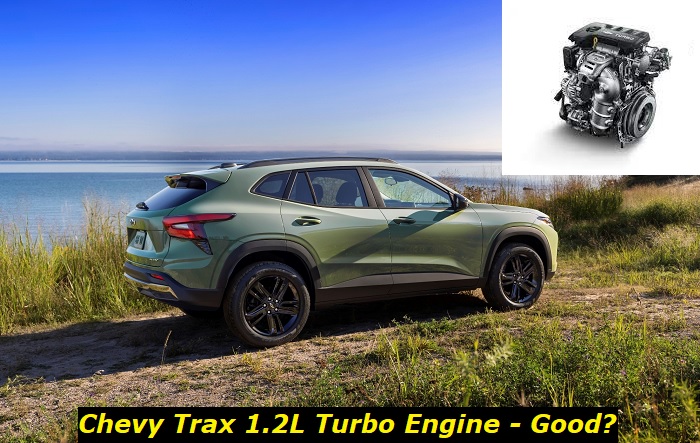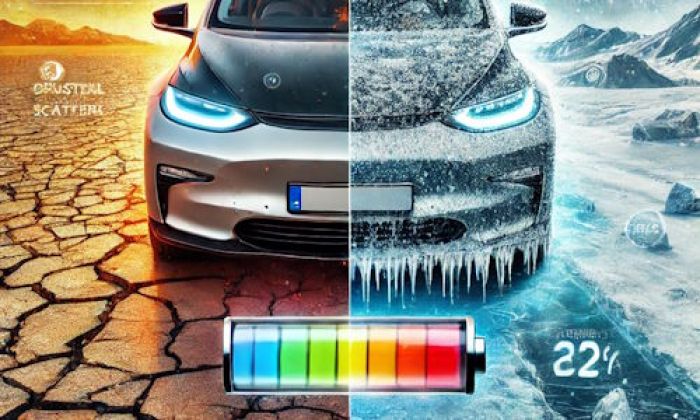The Trax keeps losing the market in 2023 selling just about 25,000 SUVs in the previous year compared to over 100,000 sales in 2019 and 2020. But in 2024, everything may change dramatically. Chevy launches the new Trax and I've already taken a look at it. The new Trax is going to be revolutionary in terms of design and onboard tech, but what about its engine?
Today, I will tell you more about the 1.2L LIH 3-cylinder turbocharged engine that is going to be available in the Chevy Trax starting with the 2024 model year. This is a very well-known Chevy engine that has already gathered a lot of opinions, reviews, and, unfortunately, reports, so I know quite a lot about it even without test-driving the new Trax model.

Key features and my opinion about the engine
- Production years:2019-now
- Average lifespan of LIH:150,000-180,000 miles
- Fuel supply type:direct injection
- Power range:137 hp
- Fuel efficiency:good
- Engine block material:aluminum
- Engine reliability score:low
- The most common problems:vibrations, start-stop problems, EVAP system problems, carbon buildup on intake valves.
Key facts about the Chevy Trax 1.2L Turbo engine
This is the E-Turbo series of engines by GM that was introduced in 2018-2019, mostly for Korean and European markets. In the USA, this series of engines started its sales with the 2020 model of the Trailblazer. The 1.2L Turbo replaces the previous SGE-series 1.4L Turbo engine that powered the Chevy Trax before.
I wouldn't say the 1.4L 4-cylinder engine was without its flaws, but I really liked it more than the 1.2L one. I personally, hate the idea of downsizing engines' displacement, restricting the number of cylinders, and installing a huge turbo to compensate for the power loss. Naturally, this will affect the durability and make you pay more in the end. But we can do nothing - ecology standards are getting tougher.
So, here's what we know about this engine:
- this is a three-cylinder 1.2-liter LIH gasoline turbocharged engine with 137 horsepower and 162 lb-ft - a lot of torque for such a displacement;
- the engine has purely direct injection without any port injectors, so it will be prone to buildup problems;
- the camshafts are driven by a belt (the belt-in-oil configuration) like in the 1.0 EcoBoost, and it's not that bad, but there are also balance-shaft chains to keep in mind;
- the engine is all-aluminum, of course, it's very light and takes just a little space under the hood of the Trax;
- this engine is equipped with a pretty good and durable six-speed automatic transmission which is smooth in operation;
- the engine provides you with great torque starting with low RPM, so it's really fun to drive this vehicle;
- the gas mileage in the city is rated at 28 MPG while on highways the engine allows you to enjoy 32 MPG.
I know the gas mileage ratings seem to be good in comparison with some other compact SUVs on the market. But if I'm buying a 3-cylinder engine with so little displacement, I'm likely to want a better fuel economy. The 28MPG in the city estimation just proves that this engine will not be relaxed under the hood of the Trax.
But anyway, this is not a bad engine at all. With its little displacement, it manages to give you quite a lot of power that is available from the first touch on the gas pedal. The Trax will feel sporty and active and it makes this car a great choice for a young driver. Let's see if all the other aspects of this engine will make you want to buy it.
How many miles will the 1.2L Turbo last in your Trax?
This is probably the dullest section in the article and if you've already decided to buy the Trax with the 1.2L turbocharged engine, you should skip it. Unfortunately, the longevity of the vehicle is not going to be surprisingly great. 3 cylinders, little displacement, lots of power and torque squeezed out of this displacement - these are the factors that make me doubt any claims about good longevity of the 1.2L 3-cylinder Chevy engine.
Let's say so, you will be lucky to get this engine to 120,000 miles without needing really expensive and massive repairs and rebuilds. The 1.2L Turbo engine is not going to last more than that even with good maintenance and careful driving.
But with careless use and poor maintenance, the engine may fail even sooner than that. Lots of units are doubtful when it comes to longevity - the turbocharger, the 3-cylinder block, the head, etc.
The good news is that the transmission is going to last even longer than the engine. If maintained properly, it may go up to 150,000 miles without repairs. Even after that, you can repair it and drive up to 200K miles if your engine is still good to go.
What are the major problems of the 1.2L Turbo Trax engine?
I believe this engine has one problem - it's downsized and has to cope with a lot of stress each time you drive your new Trax. All other issues come from this problem and are inevitable at high-mileage engines. But still, I believe there will be Trax owners who will take their SUVs to 200,000 miles and won't experience any problems with this engine.
Let's see what potential issues you should know about:
1. Timing belt failure
The belt in these engines is emerged into oil and it can go quite a long time. But I would still recommend replacing it along with the entire kit every 40,000 miles. This will ensure that the belt and the oil pump won't go bad. If the belt jumps a couple of teeth or breaks in this engine, the entire unit will most likely be destroyed without lots of chances for repair.
Although the process of timing belt replacement is not that simple for these engines, you better stick to the recommended interval.
2. Cold weather problems
Turbocharger's intercoolers in these engines are known to be weather-dependent. They will freeze when it's cold outside and the turbo will lose its efficiency. While in most cases, the problem will disappear when the engine is fully warmed up, in some situations, the intercooler may be damaged. Its replacement is not a cheap thing, so better avoid leaving your Trax outside for a winter night.
3. Scratched and misshaped engine block
The block is not that strong but it may be subjected to overheating due to high average RPM. To drive your Trax more or less actively, you will need to rev up the engine. This will lead to overall high RPM and some overheating inside the engine. This may eventually reduce the lifespan of the engine block.
Unfortunately, these blocks can't be repaired, so if damaged, they will have to be replaced. Even though the block is very small, it's not that cheap to buy new.
4. Turbocharger failure is possible
One of the reasons the turbo will be at risk in your new Trax is that the engine needs to be rotated quite badly in order to get decent acceleration. The turbocharger in an average 4-cylinder engine stays passive most of the time when the vehicle is driven on highways, for example. But in the 1.2L Turbo in your Trax, the turbocharger will be working like a horse.
This means that at 60-80 thousand miles, the turbocharger will most likely fall apart and need replacement or very expensive repairs. If you notice oil consumption, loss of power, or strange noises from under the hood, just know that the turbo needs your attention.
How can you prolong the life of the 1.2L Turbo LIH in the Trax?
So, your new Chevy Trax just doesn't have any other options but the E-Turbo 1.2L engine. The engine feels good when you drive the car but now you may be concerned about its longevity.
Here are some of the most common things you may do to prolong its life:
- provide it with oil and filter changes more often than stated by Chevy;
- air filters should be changed also more often to avoid air blockage;
- turbocharger needs proper attention after the engine reaches 50,000 miles - test it and check its health after that;
- avoid aggressive driving - this is the engine for very calm and reasonable driving habits if you want to own the SUV for a long time;
- avoid using any other oil but OEM - this one is tested by GM and lubricates the engine properly;
- change the timing belt every 40,000 miles to avoid big issues with the engine;
- don't ignore the warning lights and error messages that the Trax shows you.
I believe the best way to prolong your engine's life is to maintain and repair it in dealerships. Chevrolet knows well all the downsides and tricky features of this engine, so the company will continue issuing one service bulletin after another to let dealers maintain these engines properly and correct all the possible flaws.
Personally, I don't like the idea of downsized engines. Although the 1.2L Turbo in the Chevy Trax seems to be a decent engine, I would consider getting a hybrid SUV or even one of the affordable EVs instead. But, if you want a pure gas-powered vehicle, the Trax is not a bad option.
About the authors
The CarAraC research team is composed of seasoned auto mechanics and automotive industry professionals, including individuals with advanced degrees and certifications in their field. Our team members boast prestigious credentials, reflecting their extensive knowledge and skills. These qualifications include: IMI: Institute of the Motor Industry, ASE-Certified Master Automobile Technicians; Coventry University, Graduate of MA in Automotive Journalism; Politecnico di Torino, Italy, MS Automotive Engineering; Ss. Cyril and Methodius University in Skopje, Mechanical University in Skopje; TOC Automotive College; DHA Suffa University, Department of Mechanical Engineering






Add comment